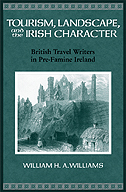Tourism,
Landscape, and the Irish Character
British Travel Writers
in Pre-Famine Ireland
William H. A. Williams
History of Ireland and the Irish Diaspora
"A fascinating and absorbing account
of how British travel writers contributed not only to the construction of Ireland
as a particular place but how Ireland became a site for reinventing
England."—Michael Cronin,
Dublin City University, Ireland
British tourists in Ireland in the eighteenth
and nineteenth centuries were both charmed and repulsed. Picturesque
but poor, abject yet sublime in its Gothic melancholy, the Ireland
they experienced did not fit their British sense of progress,
propriety, and Protestantism. Tourism, Landscape, and the
Irish Character draws from more than one hundred accounts
by English, Scottish, Welsh, and Anglo-Irish tourists written
between 1750 and 1850 to probe the moral judgments British observers
made about the Irish countryside and its native inhabitants.
Whether consciously or not, these travel writers defined their
own British identity in opposition to a perceived Irish strangeness:
the rituals of Catholicism, the seemingly histrionic lamentations
of the funeral wake, cemeteries with displays of human bones,
the archaic Irish language or the Celtic-infused English that
they heard spoken. Overlooking the acute despair in England's
own industrial cities, they opined that the poverty, bog lands,
and ill-thatched houses of rural Ireland indicated failures of
the Irish character.
By the eve of the Famine of the 1840s, travel writers were employing
stereotypes of Celtic, Catholic carelessness in the south of
Ireland and Saxon neatness and enterprise in predominantly Protestant
Ulster, even calling for "Saxon" colonization of the
west of Ireland. The Famine cleared the land of many of the peasants,
but the western landscape, magnificent in its scenery but poor
in its soil, eventually defeated most of the British "colonists,"
leaving the region to an ever-increasing number of tourists who
could enjoy the picturesque mountainscapes without the distracting
contradiction of an impoverished populace.
History of Ireland and the Irish Diaspora
James S. Donnelly, Jr., and Thomas Archdeacon, Series Editors
William
H. A. Williams is professor of
history at Union Institute and University in Cincinnati, Ohio.
He has published widely on Irish history and culture, including
the award-winning book, 'Twas Only an Irishman's Dream: The
Image of Ireland and the Irish in American Popular Song Lyrics,
1800–1920.
Media & bookseller inquiries regarding review copies, events, and interviews can be directed to the publicity department at publicity@wwwtest.uwpress.wisc.edu or (608) 263-0734. (If you want to examine a book for possible course use, please see our Course Books page. If you want to examine a book for possible rights licensing, please see Rights & Permissions.)
Of Related Interest
Remembering
the Year of the French
Irish Folk History and Social Memory
Guy Beiner
|
|

First Paperback Edition
January 2008
304 pp. 6 x 9 10 b/w illus.
|
